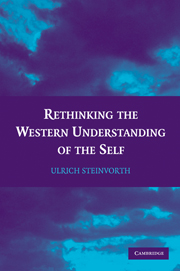Book contents
- Frontmatter
- Contents
- Preface
- Part I Introduction
- Part II Basics of Philosophical Psychology
- Chapter 2 Heideggerian and Cartesian Self
- Chapter 3 Free Will
- Chapter 4 Cartesian, Lockean, and Kantian Self
- Chapter 5 Extraordinariness and the Two Stages of Rationality
- Part III The Cartesian Self in History
- Part IV Value Spheres
- Part V A Self-Understanding Not Only for the West
- Select Bibliography
- Index
Chapter 2 - Heideggerian and Cartesian Self
Published online by Cambridge University Press: 05 June 2012
- Frontmatter
- Contents
- Preface
- Part I Introduction
- Part II Basics of Philosophical Psychology
- Chapter 2 Heideggerian and Cartesian Self
- Chapter 3 Free Will
- Chapter 4 Cartesian, Lockean, and Kantian Self
- Chapter 5 Extraordinariness and the Two Stages of Rationality
- Part III The Cartesian Self in History
- Part IV Value Spheres
- Part V A Self-Understanding Not Only for the West
- Select Bibliography
- Index
Summary
Like wittgenstein a decade later, heidegger rejected the undifferentiated conception of the subject-self developed by empiricists in the seventeenth century. Yet unlike Wittgenstein, Heidegger replaced the subject-self by an unequal couple: an inauthentic self, the self of das Man or them (or the man selbst) that ordinarily guides the person; and an authentic self that does so extraordinarily, in special cases and times. Both his rejection of the traditional conception of the subject and his distinction of an inauthentic and an authentic self are momentous philosophical achievements. His conception of the authentic self, though, is burdened with problems. He starts his Being and Time by analyzing how we know or have access to our world, the world all men share and know they share. We do so by social interaction that precedes what according to empiricism is the first step in knowing the world, namely, its construction out of sense impressions by a subject-self.
To mark out the importance of this thesis, let me explicate it by Wittgensteinian ideas. The sense impressions that empiricists say the world is constructed from are given to the subject-self independently of its interaction with other individuals. They are private in the sense that others can never know what they are. So the world is as private and unrelated to other people as the sense impressions it is constructed from. Hence, empiricism suggests solipsism, the view that the only thing I know exists is my mind. Yet solipsism is too absurd to be accepted.
- Type
- Chapter
- Information
- Rethinking the Western Understanding of the Self , pp. 15 - 23Publisher: Cambridge University PressPrint publication year: 2009

